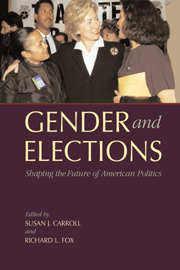Book contents
- Frontmatter
- Contents
- List of Figures, Text Boxes, and Photo
- List of Tables
- Acknowledgments
- List of Contributors
- Introduction: Gender and Electoral Politics into the Twenty-First Century
- 1 Presidential Elections
- 2 Voter Participation and Turnout
- 3 Voting Choices
- 4 Congressional Elections
- 5 African American Women and Electoral Politics
- 6 Political Parties and Women's Organizations
- 7 Advertising, Web Sites, and Media Coverage
- 8 State Elections
- Index
3 - Voting Choices
Meet You at the Gender Gap
Published online by Cambridge University Press: 05 June 2012
- Frontmatter
- Contents
- List of Figures, Text Boxes, and Photo
- List of Tables
- Acknowledgments
- List of Contributors
- Introduction: Gender and Electoral Politics into the Twenty-First Century
- 1 Presidential Elections
- 2 Voter Participation and Turnout
- 3 Voting Choices
- 4 Congressional Elections
- 5 African American Women and Electoral Politics
- 6 Political Parties and Women's Organizations
- 7 Advertising, Web Sites, and Media Coverage
- 8 State Elections
- Index
Summary
The date is October 22, 2004, less than two weeks before the November 3 election that will determine whether the Republican incumbent, George W. Bush, or the Democratic challenger, John Kerry, will serve as President of the United States for the next four years. Polls show the race is very close.
John Kerry has recently been interviewed on “Live with Regis and Kelly” and has appeared with his wife, Teresa Heinz Kerry, on the “Dr. Phil” show to talk about his marriage, divorce, and children. On October 22, he campaigns in Milwaukee, Wisconsin, with Caroline Kennedy Schlossberg, daughter of the late President John F. Kennedy, at his side. In his speech to a Milwaukee audience, Kerry tells women voters:
You worry when you hear a child, a son or daughter, cough in the middle of the night…. You worry when they go out in the morning just to play, because you can't afford an illness. You can't afford an accident. You and your husband worry at the kitchen table after the kids have gone to bed, and when the month's paychecks don't cover all the bills…. No matter how tough it gets, no one in the White House seems to be listening.
He claims that both health care premiums and the pay gap between men and women have increased under President Bush, and he vows that as President he will raise the minimum wage, helping millions of women who work in low-paying jobs.
- Type
- Chapter
- Information
- Gender and ElectionsShaping the Future of American Politics, pp. 74 - 96Publisher: Cambridge University PressPrint publication year: 2005
- 6
- Cited by



